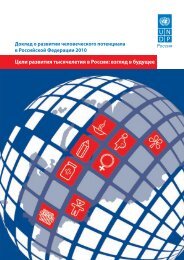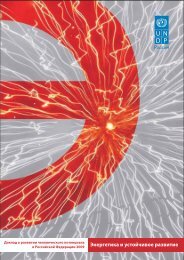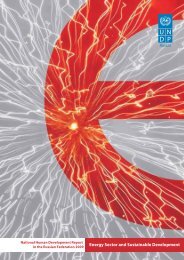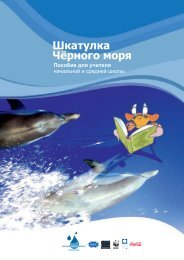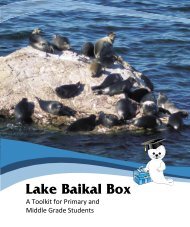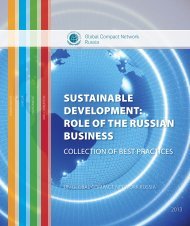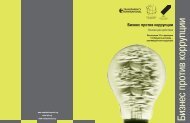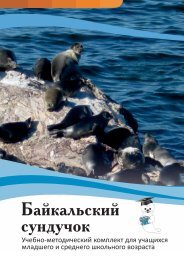Report - UNDP Russia
Report - UNDP Russia
Report - UNDP Russia
You also want an ePaper? Increase the reach of your titles
YUMPU automatically turns print PDFs into web optimized ePapers that Google loves.
educational process met the demands of potentialemployers and students 22 . Power engineering wasamong the fields studied. The findings are quitedisturbing. Almost a quarter of students nearingcompletion of their education said that they wouldlike to adjust their specialization but could not do so,because the field they were majoring in is toonarrowly defined and their schools provide no flexiblemechanisms for changing specialization betweenadmission and graduation. Some 80% of students saidthat all the courses in their study programme weremandatory.The research also found that students aregenerally expected to be passive recipients ofknowledge. According to the survey results, 95% ofstudents nearing completion said that lectures werethe primary mode of instruction, 20% said theynever participated in a discussion or projectworking in a small group, and a third had neverprepared their own presentations. In most cases theinstructor was the primary source of information,with few students trying to search for informationon their own. Only 20% of students surveyed hadparticipated in projects of their instructors, 33% ofthe students nearing completion had never doneprojects of their own, 55% had not implementedprojects as part of a group, 55% had not preparedany presentation on a completed project, 85% hadnever been involved in projects for real customers,60% had never read books on their subject in aforeign language.Results of the education process are verifiedmainly by oral and written examinations and throughoral defence of course papers. Tests in class are usedvery seldom, while 60% of surveyed students hadnever had to write an essay.Links between universities and potentialemployers are very limited. Some 63% of studentsnearing completion knew either very little or nothingat all about working conditions in <strong>Russia</strong>n companiesfor graduates with their specialization (though 90%had been through some kind of work experience), andonly 32% had been given any information about whatto expect in their future jobs by their universities. Only37% had met with representatives of their potentialemployers, while 15% said that they had never beenintroduced to any technical, economic, or corporatenews of relevance to their profession. Finally, only35.9% of graduates with engineering degrees(including those with degrees in power engineering)find work in their field after graduation 23 .Based on the above, we can justifiablystate that:• Engineering universities and engineeringspecializations have to a large extent lost theirprestige in comparison with other types of highereducation. They seem willing to accept lowqualitystudents in order to fully use their intakequotas;• Narrowly defined specializations andimpossibility of fine-tuning individual trajectorieslead to a situation where a significant part of thetechnologies taught at university are obsolete incomparison with what graduates will have todeal with once they enter the job market.Students themselves are often frustrated by theimpossibility of tailoring the education, whichthey receive, to their individual preferences.• The passive role assigned to students in theeducation process, lack of hands-on experienceof working on projects alone or in groups orworking for real customers, lack of demand forinitiative, ambition and creativity, and lack ofawareness of the international technologicalframework tends to make graduates incapable ofinnovation, and suited only for roles astechnicians rather than engineers.To conclude, we will try to point out the mainrespects, in which <strong>Russia</strong>n technical higher education(including power engineering) has deteriorated, andpropose some steps that need to be taken in order torectify the situation.22An integrated assessment of education standards for students approaching graduation and of employment by aerospace companiesof graduates from specialized higher education schools. The research was carried out by United Aircraft Manufacturing Corporation aspart of work to design a system for supporting education of students and employment of graduates in the aerospace industry. See also:Maria Dobryakova, Isak Froumin. Higher engineering education in <strong>Russia</strong>: incentives for real change // International Journal ofEngineering Education. 2010, spring (forthcoming).23V. Gimpelson, R. Kapelushnikov, T. Karabchuk, Z. Ryzhikova, T. Bilyak. Choosing a profession; what did they learn and where were theyuseful? M., GU-VHSE, 2009, page 18.72 National Human Development <strong>Report</strong> in the <strong>Russia</strong>n Federation 2009



